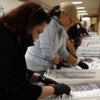Informing the world about the atrocities of the civil war raging in Syria is deadly dangerous business.
On October 15, yet another two reporters and their driver from the Abu Dhabi–based Sky News Arabia who had been sent out to cover Syria’s humanitarian crisis went missing near Aleppo. And last week, the news came that two French journalists had been kidnapped in June in the northern Syrian city of Raqqa.
Right now, Syria is the most dangerous media environment on earth. In 2012 alone, 28 reporters lost their lives in Syria.
According to Reporters Without Borders, since March 2011, when Syria’s civil war broke out in full flame, 37 international reporters have been kidnapped, 17 of whom are still missing. Both sides in this civil war are guilty in abusing and harassing members of the press. Foreign reporters from Belgium, France, Germany, Italy, Lebanon, Mauritania, Poland, Spain, Syria, and the United States have been targeted.
Meanwhile, Syrian news media have fared even worse than the international media. More than 60 Syrian reporters have been kidnapped or arrested by various armed opposition forces, and more than 200 have been captured by the regime of Syrian President Bashar Assad. The government further narrowly limits the number of reporters allowed into Syria and often denies media access to many parts of the country.
“New media” has thankfully picked up the story and driven much of the coverage in Syria. Amateur reporters—i.e., private citizens—with their smartphones have circumvented the obstacles faced by reporters from the Associated Press and other news agencies through YouTube, Twitter, and other social media sites.
Tens of thousands of videos taken by private citizens have come in, bringing the story to the global mass media. Private citizens have recorded outrage over the crackdown by the Assad regime and have also sparked concern over alleged atrocities on both sides. These videos include the images of the use of poison gas on civilians on August 21, which created an international crisis over what to do about it.
Reporting by cell phone video has also undoubtedly made news gathering more complex, because all sides use them to advance their cause. The Syrian rebels post most videos and have developed quite savvy media operations. The Assad regime has its own media machine fighting the propaganda war.
Thankfully, in the age of digital media, it is almost impossible to impose a total news blackout by terrorizing individual journalists. How to stop the suffering of the Syrian people, though, is another matter.






























